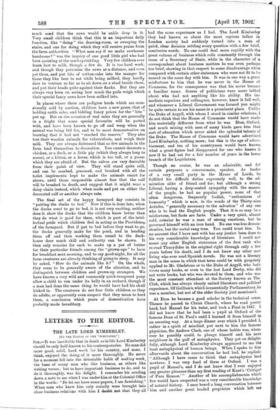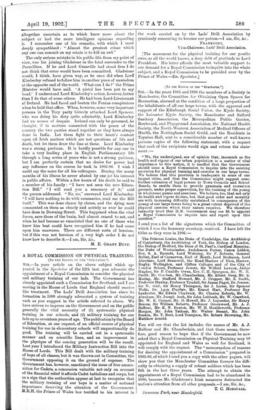LETTERS TO THE EDITOR.
THE LATE LORD KIMBERLEY.
[TO THE EDITOR OF THE "SPECTATOR."'
Sin,—It was inevitable that in death as in life Lord Kimberley should be only half-known to his contemporaries. No man did more good, solid, hard work -:or his country, and none, I think, enjoyed the doing of it more thoroughly. He never for a moment fell into the detestable habit of making work, the bane of many men who like business, as others like writing verses ; but to have important business to do, and to do it thoroughly, was his delight. I remember his sending down a note to me when I was under him at the Colonial Office in the words: "Do let me have some papers, I am famishing." When men who knew him only socially were brought into close business relations with him. I doubt not that they all
had the same experience as I bad. The Lord Kimberley they had known as about the most copious talker in London society had suddenly turned into a man of quick, clear decision settling every question with a few brief, conclusive words. No one could deal more rapidly with the great volume of business which rolls constantly through the room of a Secretary of State, while in the character of a correspondent about business matters he was even perhaps too brief, showing in that respect to some disadvantage when compared with certain other statesmen who were not fit to he named on the same day with him. It was in one way a great misfortune to him that he was never in the House of Commons, for the consequence was that his never became a familiar name. Scores of politicians were more talked about who had not anything like his ability. His im- mediate superiors and colleagues, however, knew it full well, and whenever a Liberal Government was formed you might be quite certain to see his name in a prominent place. Unlike the Duke of Argyll, with whom I stood in similar relations, I do not think that the House of Commons would have made him materially different from what he was. Eton, Oxford, and much mixing with men of many kinds gave him that sort of education which never aided the splendid talents of the Duke. The House of Commons would have advertised Lord Kimberley, nothing more; but this is the age of adver- tisement, and ten of his countrymen would have known what a great figure had disappeared for one who knows it now if he had sat for a fair number of years in the lower branch of the Legislature.
Though no orator, he was an admirable, and for certain purposes a consummate, speaker. As leader of a very small party in the House of Lords, he fulfilled his difficult duties supremely well, to the ad- miration alike of friend and foe; but although a strong Liberal, having a deep-seated sympathy with the masses of the people, he had no popular power, none of that often dangerous, frequently foolish, " enthusiasm of humanity " which is now, in the words of the Thirty-nine Articles, " generally necessary to the salvation" of any one who is to lead the English people. That it is so may be a misfortune, but facts are facts. Under a very quiet, almost cold, exterior he was a man of strong emotions, but be governed himself with an iron hand. No one was less demon- strative, but the metal rang true. You could trust him. In no account that I have met with has any justice been done to his very considerable knowledge of literature. I could not name any other English statesman of the first rank who re-read Thucydides in the original right through only a few years before his death, and I do not know any other now living who ever read Spanish novels. He was not a literary man in the sense in which that term could be with propriety applied to Mr. Gladstone or to the Duke of Argyll, who both wrote many books, or even to the last Lord Derby, who did not write books, but who was devoted to them, and who was the most constant attendant at the Society known as The Club, which has always closely united literature and political experience. Of Grillion's, which is essentially Parliamentary, he was a member, but not of the older Society just mentioned.
At Eton he became a good scholar in the technical sense. Thence he passed to Christ Church, where he read pretty hard, had Mansel for his tutor, and took a First in 1847. I did not know that he had been a pupil at Oxford of the famous Dean of St. Paul's until I learned it from himself in an amusing way. At a large dinner over which I presided I, rather in a spirit of mischief, put next to him the famous physician, Sir Andrew Clark, one of whose habits was, when- ever he possibly could, to plunge himself and his next neighbour in the gulf of metaphysics. They got on delight- fully, although Lord Kimberley always appeared to me the least metaphysical of human beings. When I spoke to him afterwards about the conversation he had had, he replied: " Although I have come to think that metaphysics lead nowhere, I was very fond of them at Oxford. I was a pupil of Mansel's, and I do not know that I ever enjoyed any greater pleasure than my first reading of Kant's 'Critique of Pure Reason." Another of his accomplishments which few would have suspected was a very considerable knowledge of natural history. I once heard a long conversation between him and another great landed proprietor which left me
altogether uncertain as to which knew more about the subject or had the more intelligent opinions regarding it. I remember one of his remarks, with which I most deeply sympathised : " Almost the greatest crime which any one can commit on my estate is to kill an owl."
The only serious mistake in his public life, from my point of view, was his joining Gladstone in the fatal surrender to the Parnellites. If he and Lord Granville had stood firm I do not think that error would have been committed. Gladstone would, I think, have given way, as he once did when Lore Kimberley refused to follow him in another piece of unwisdom at the opposite end of the world. ` What can I do ? ' the Prime Minister would have said. ' A pistol has been put to my bead.' I understand Lord Kimberley's action, however, better than I do that of some others. He had been Lord-Lieutenant of Ireland. He had faced and beaten the Fenian conspirators when he held that office. When, however, some very important persons in the Tory party bitterly attacked Lord Spencer, who was doing his duty quite admirably, Lord Kimberley had an access of despair. Ireland can only be governed, he thought, if in matters connected with the peace of the country the two parties stand together as they have always done in India. Let them fight to their heart's content upon all Irish matters which are not questions of life and death, but let them draw the line at these. Lord Kimberley was a strong partisan. It is hardly possible for any one to take a very leading place in English Parliamentary life through a long series of years who is not a strong partisan, but I am perfectly certain that no desire for power had any influence on the course he took in 1885-86. I wish I could say the same for all his colleagues. During the many months of his illness he never abated by one jot his interest in public affairs. Within a few hours of his death he said to a member of his family : " I have not seen the new Educa- tion Bill." " I will read you a summary of it," said the person addressed. " No, no," answered Lord Kimberley. " I will have nothing to do with summaries, read me the Bill itself." This was done clause by clause, and the dying man commented on them as clearly and acutely as ever he could have done in Downing Street. This happened when the vital forces, save those of the brain, had almost ceased to act, and when he had become so emaciated that no one of those who knew him best could have recognised him if he had come upon him unawares. There are different sorts of heroism, but if this was not heroism of a very high order I do not know how to describe it.—I am, Sir, &c., M. E. GRANT DUFF.











































 Previous page
Previous page